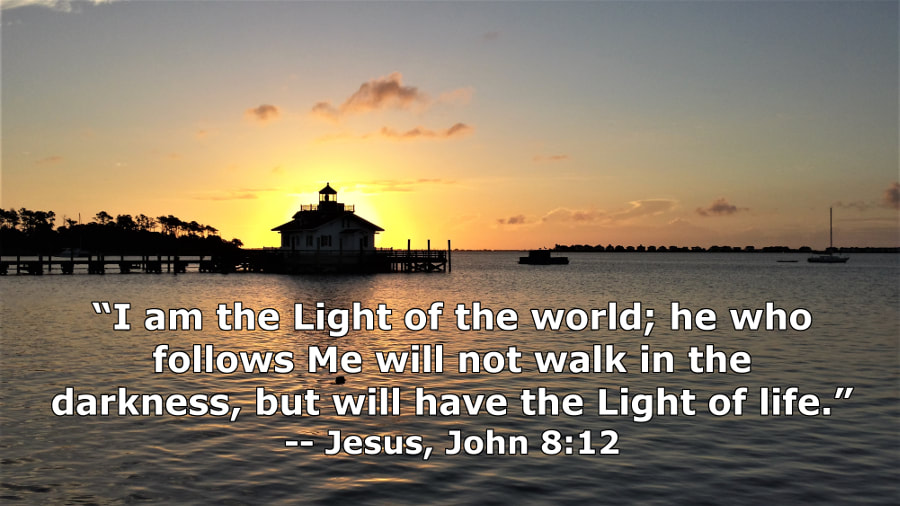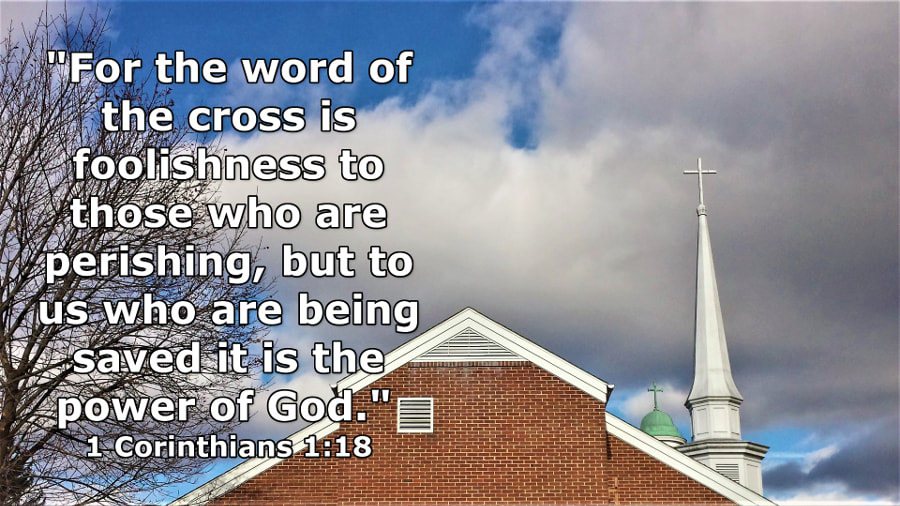"Then Jesus again spoke to them, saying, 'I am the Light of the world; he who follows Me will not walk in the darkness, but will have the Light of life.' " (John 8:12)
"I have come as Light into the world, so that everyone who believes in Me will not remain in darkness." (John 12:46)
"Christ is the Light of the world. God is light, and Christ is the image of the invisible God. One sun enlightens the whole world; so does one Christ, and there needs no more." -- Matthew Henry (1662-1714) (Ref. 1, Ref. 2)
This lesson is the first in a series on the "I AM" statements of Christ. This lesson discusses Jesus' statement, "I am the Light of the world" (John 8:12).
Consider. What does it mean to you that Jesus is the Light of the world? Do you have the Light of life?
God is Light
The teaching that God is Light begins in the Old Testament and continues through the New Testament. David wrote, "The Lord is my light and my salvation; Whom shall I fear?" (Psalm 27:1). The prophet Micah said, "Though I dwell in darkness, the Lord is a light for me" (Micah 7:8). The disciple John, wrote, "God is Light, and in Him there is no darkness at all" (1 John 1:5).
God's Light Purposely Illumines Mankind
Jesus' Jewish listeners would recall Exodus 13:21 - "The Lord was going before them in a pillar of cloud by day to lead them on the way, and in a pillar of fire by night to give them light, that they might travel by day and by night." The psalmist wrote, "Thy word is a lamp unto my feet, and a light unto my path" (Psalm 119:105). The author of 2 Samuel 22:29 tells us "For You are my lamp, O Lord; And the Lord illumines my darkness."
"I am the Light of the world"
Jesus, the Eternal One, is the Light of the world because:
"He who follows Me will not walk in the darkness"
Let's discuss this phrase in three parts:
a) "He who follows Me" - The Greek word for follow is akoloutheó, which means to join as a disciple (Ref. 5). In John 8:12, Jesus "likens himself to a torch which the disciple follows" (Ref. 5). Jesus frequently spoke about what it means to follow him as a disciple (for example, Luke 14:27). b) "Will not walk" - The Greek word for walk is peripateó. Peripateó means (in the ethical sense) how I conduct my life (Ref. 6). c) "In the darkness" - The Greek word for darkness is scotia (Ref. 7). Scotia has a dual meaning. In the literal sense, scotia (darkness) is the absence of daylight (John 6:17). In the figurative sense, scotia (darkness) is the state we are in before we believe in Christ, that is, a state of ignorance, guilt, and sin (Ref. 8). Putting these three parts together - "He who follows Me shall not walk in darkness" means He who follows Me [Jesus] as a disciple will no longer conduct his life in a state of ignorance, guilt, and sin. Note that Jesus also said, "I have come as Light into the world, so that everyone who believes in Me will not remain in darkness" (John 12:46, italics added). Being in darkness is our (mankind's) default condition. Jesus has come so that when we believe in him, God the Father transfers us from the domain of darkness to the kingdom of the Son of God (Colossians 1:13). "But will have the Light of life"
Just as sight is a function of physical life, Christ is the Light for our spiritual life. John says, referring to Christ, "In Him was life, and the life was the Light of men" (John 1:4). When we believe in Jesus Christ, the divine light of Christ continually shines in us, guiding us to life everlasting (Ref. 9).
Apply. Do you believe that Jesus Christ is the Light of the world? If not, then pray and put your trust in him today.
Are you a disciple of Christ? Are you following him? Do you have the Light of life?
References
1. https://biblehub.com/commentaries/mhc/john/8.htm 2. https://en.wikipedia.org/wiki/Matthew_Henry 3. https://www.ScriptureWay.com/home/who-is-jesus 4. https://www.ScriptureWay.com/bible-verses-about-eternal-life 5. https://biblehub.com/greek/190.htm 6. https://biblehub.com/greek/4043.htm 7. https://biblehub.com/greek/4653.htm 8. https://biblehub.com/commentaries/poole/john/12.htm (Matthew Poole's Commentary on John 12:46) 9. https://biblehub.com/commentaries/benson/john/8.htm
0 Comments
"For the word of the cross is foolishness to those who are perishing, but to us who are being saved it is the power of God." (1 Corinthians 1:18)
"Those who receive the gospel, and are enlightened by the Spirit of God, see more of God's wisdom and power in the doctrine of Christ crucified, than in all his other works." -- Matthew Henry (1662-1714) (Ref. 1, Ref. 2)
This lesson describes what the Apostle Paul meant by the phrase, "the word of the cross." God loves us so much that Jesus Christ died on the cross for us, and purchased the forgiveness of our sins. We will also study why for some people, the word of the cross is foolishness and for others, it is the power of God.
Consider. When the Apostle Paul wrote the phrase, "the word of the cross" (1 Corinthians 1:18), what did he mean? In your own words, how would you explain "the word of the cross" to someone else?
Definition of "word." The Greek word for word in 1 Corinthians 1:18 is logos. Logos means something said, a message, reasoning expressed by words, and instruction (Ref. 3). Acts 13:26 and 2 Corinthians 5:19 provide examples where logos is translated as message.
Definition of "cross." The Greek word for cross is staurós. Staurós has both a literal meaning and a figurative meaning. Christ was crucified on a literal Roman cross (Ref. 4). According to HELPS Word-Studies, "Staurós was the crosspiece of a Roman cross; the cross-beam was placed at the top of the vertical member to form a capital 'T' (Ref. 4). "This transverse beam was the one carried by the criminal" (Ref. 4, Matthew 27:31-32, John 19:17). In addition to the shape of a capital "T," researchers also discuss the cross in the shape of a cruciform ("†" or "✚") and as a vertical stake (Ref. 5). Most Christian denominations present the Christian cross in the shape of a cruciform (Ref. 5, Ref. 6).
Staurós also has a figurative meaning. Jesus spoke about the cross each believer bears to be his true follower (Ref. 4, Matthew 10:38, Mark 8:34, Luke 9:23). Thayer's Greek Lexicon describes the figurative cross as an expression used by "those who, on behalf of God's cause, do not hesitate cheerfully and manfully [courageously] to bear persecutions, troubles, distresses — thus recalling the fate of Christ and the spirit in which he encountered it" (Ref. 4, brackets added). What is meant by the expression, "the word of the cross"?
The word, or message, of the cross is that God loves us so much that his Son, Jesus Christ, was crucified and died on the cross for us. Through his sacrifice, Jesus Christ has purchased the forgiveness of our sins. Through Jesus Christ, those who believe in him receive salvation and eternal life.
"But God demonstrates His own love toward us, in that while we were yet sinners, Christ died for us" (Romans 5:8). "For God so loved the world, that He gave His only begotten Son, that whoever believes in Him shall not perish, but have eternal life" (John 3:16). Foolishness to those who are perishing
The Greek word for foolishness is mória. Mória means folly, absurdity, foolishness (Ref. 7). The Greek word for perish is apollumi which means destroy utterly (Ref. 8). HELPS Word-Studies further defines apollumi as "to die, with the implication of ruin and destruction" (Ref. 8).
Why would Paul write that the message of the cross "is foolishness to those who are perishing" in 1 Corinthians 1:18? 1. "To the Jews 'the cross' was the tree of shame and horror; and a crucified person was 'accursed of God' " (Ref. 9, Deuteronomy 21:23). To the Jews, the thought of "a crucified Messiah" seemed "a revolting folly" (Ref. 9). 2. To Paul's Greek audience, the cross was the punishment for slaves and murderers (Ref. 9). The cross meant shame and agony. To the Greeks, worshiping "a crucified malefactor" was superstitious (Ref. 9). 3. Paul explains, "But a natural man does not accept the things of the Spirit of God, for they are foolishness to him; and he cannot understand them, because they are spiritually appraised" (1 Corinthians 2:14). The natural man, who is "not truly enlightened and renewed by the Word and Spirit of God, and therefore has no other way of obtaining knowledge but by his senses and natural understanding … does not understand or apprehend the things of the Spirit of God" (Ref. 10). To us who are being saved it is the power of God
The Greek word for saved is sózó, which means rescued from destruction and brought into divine safety (Ref. 11). The Greek word for power in 1 Corinthians 1:18 is dunamis. Dunamis means (miraculous) power, might, strength (Ref. 12).
The cross is much more than a decoration. "The cross is God's saving power" (Expositor's Greek Testament, Ref. 13). For us who are being saved, the cross is the means by which Jesus has forgiven our sins and rescued us from the path of destruction. By the cross, God offers us the gift of eternal life when we believe in Jesus Christ, God's Son. When we share the "word of the cross" with others, we share not a fable but God's mighty plan for saving people. "For I am not ashamed of the gospel, for it is the power of God for salvation to everyone who believes, to the Jew first and also to the Greek" (Romans 1:16).
Apply. God gives us only two choices. Either we are on the path of perishing or we are on the path of salvation. On which path are you? If you do not know Christ, put your faith in him today, and receive from him forgiveness of your sins and the gift of eternal life. If you do know Christ, thank him for his sacrificial death on the cross to forgive your sins, and for his power working in you each day.
References
1. https://biblehub.com/commentaries/mhc/1_corinthians/1.htm 2. https://en.wikipedia.org/wiki/Matthew_Henry 3. https://biblehub.com/greek/3056.htm 4. https://biblehub.com/greek/4716.htm 5. (Ref. 5 begins on the next line) https://en.wikipedia.org/wiki/Instrument_of_Jesus%27_crucifixion 6. https://en.wikipedia.org/wiki/Christian_cross 7. https://biblehub.com/greek/3472.htm 8. https://biblehub.com/greek/622.htm 9. https://biblehub.com/commentaries/pulpit/1_corinthians/1.htm 10. https://biblehub.com/commentaries/benson/1_corinthians/2.htm 11. https://biblehub.com/greek/4982.htm 12. https://biblehub.com/greek/1411.htm 13. https://biblehub.com/commentaries/egt/1_corinthians/1.htm |
Daily Bible Verse(Click the link above) AuthorMr. Whitney V. Myers. Christian. For more information, please visit the Author Page. Posting ScheduleI plan to provide new postings about once a month. Planned Topics(subject to change) Recent Posts(most recent three months) Popular Posts(top 10) Categories
All
Archives
July 2024
|
|
Copyright 2018-2024 Whitney V. Myers |
Listed in Feedspot's Top 100 Bible Study Blogs and Websites |


 RSS Feed
RSS Feed
